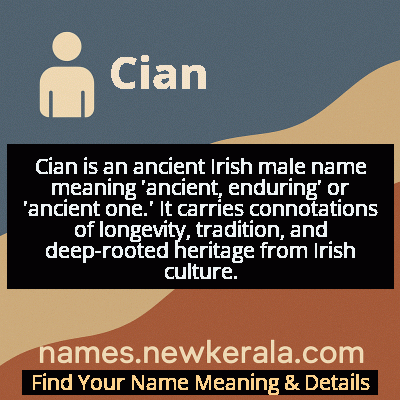Cian Name Meaning & Details
Origin, Popularity, Numerology Analysis & Name Meaning of Cian
Discover the origin, meaning, and cultural significance of the name CIAN. Delve into its historical roots and explore the lasting impact it has had on communities and traditions.
Name
Cian
Gender
Male
Origin
Irish
Lucky Number
9
Meaning of the Name - Cian
Cian is an ancient Irish male name meaning 'ancient, enduring' or 'ancient one.' It carries connotations of longevity, tradition, and deep-rooted heritage from Irish culture.
Cian - Complete Numerology Analysis
Your Numerology Number
Based on Pythagorean Numerology System
Ruling Planet
Mars
Positive Nature
Generous, passionate, energetic, and humanitarian.
Negative Traits
Impulsive, impatient, moody, and can be overly emotional.
Lucky Colours
Red, maroon, scarlet.
Lucky Days
Tuesday.
Lucky Stones
Red coral, garnet.
Harmony Numbers
1, 2, 3, 6.
Best Suited Professions
Military, sports, philanthropy, leadership roles.
What People Like About You
Courage, energy, leadership, generosity.
Famous People Named Cian
Cian mac Máelmuaid
Mythological King
Legendary King of Munster and ancestor of the Eóganachta dynasty
Cian O'Connor
Equestrian
Irish Olympic show jumper who won bronze at the 2012 London Olympics
Cian Healy
Rugby Player
Professional rugby player for Leinster and Ireland with multiple Six Nations championships
Cian Ciaran
Musician
Keyboardist and founding member of the Welsh rock band Super Furry Animals
Name Variations & International Equivalents
Click on blue names to explore their detailed meanings. Gray names with will be available soon.
Cultural & Historical Significance
The name's survival through periods of colonization and cultural suppression demonstrates its resilience and importance in Irish identity. During the Gaelic Revival of the late 19th and early 20th centuries, names like Cian experienced renewed interest as symbols of cultural reclamation. Today, Cian represents not just personal identity but cultural continuity—a living link to Ireland's ancient past that has maintained its authenticity while adapting to modern usage. Its continued popularity reflects the enduring power of Irish cultural heritage and the importance of preserving linguistic and naming traditions.
Extended Personality Analysis
Individuals named Cian are often characterized by a unique blend of traditional values and modern adaptability that reflects their name's ancient origins and contemporary relevance. They typically possess a quiet confidence and inner strength that doesn't require external validation, along with a deep sense of loyalty to family and heritage. Many Cians demonstrate natural leadership qualities combined with thoughtful introspection, making them effective in positions requiring both decisive action and careful consideration. Their connection to history often gives them perspective and wisdom beyond their years, while their modern sensibilities keep them grounded in present realities.
This combination of traits frequently manifests as resilience in facing challenges and creativity in problem-solving. Cians tend to be reliable friends and partners who value deep, meaningful connections over superficial relationships. They often exhibit a strong moral compass and sense of justice, likely influenced by the name's association with noble figures from Irish mythology and history. Their personality typically balances respect for tradition with openness to innovation, making them particularly effective as bridges between established practices and new approaches. This duality allows them to honor their roots while embracing progress and change.
Modern Usage & Popularity
Cian has experienced a remarkable resurgence in modern times, becoming one of Ireland's most popular boys' names and gaining significant traction internationally. In Ireland, it consistently ranks within the top 50 names for boys, with particular strength in urban areas and among families with strong cultural awareness. The name's popularity reflects broader trends in Celtic name revival and the growing pride in Irish heritage both within Ireland and among the global diaspora. Its appeal lies in its authentic Gaelic roots, easy pronunciation, and strong, single-syllable impact that works well in multicultural contexts. The name's modern usage demonstrates how ancient names can be revitalized while maintaining their cultural integrity, serving as both personal identifiers and symbols of cultural continuity in an increasingly globalized world.
Symbolic & Spiritual Meanings
Symbolically, Cian represents the enduring spirit of Irish culture and the continuity of tradition across generations. The name carries deep metaphorical significance as a bridge between ancient Celtic civilization and contemporary Irish identity, embodying the resilience of cultural heritage despite historical challenges. It symbolizes wisdom passed down through centuries, strength rooted in ancestral legacy, and the preservation of linguistic and cultural identity. Metaphorically, Cian suggests depth of character and historical consciousness—someone who carries the collective memory and values of their ancestors while navigating modern life. The name evokes images of standing stones that have weathered centuries yet remain firmly grounded, representing stability, endurance, and the timeless quality of cultural traditions that adapt while maintaining their essential character.

